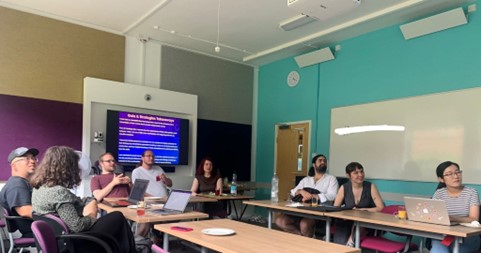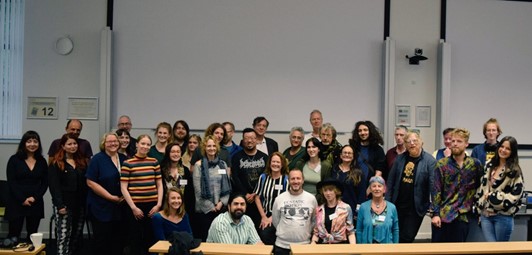With their Researcher Led Initiative Award, Eirini and Johanna brought together PhD students and ECRs from diverse disciplinary backgrounds. The ‘Transdisciplinary Consciousness Conversers’ embarked on a 4-chapter ‘reflexive journey towards our evolving understanding of consciousness’:
For each ‘chapter’, a virtual guest spoke about their work, sparking in-room discussions. Our broad range of backgrounds allowed us to transcend narrow disciplinary framings; each ‘converser’ shared their personal perspective which was further shaped by our interactions. Guided by the value of reflexivity, we used survey forms to capture reflections during and between sessions.
Chapter I introduced participants to multiple perspectives to the ‘Psychedelic Renaissance’, the recent resurgence of research on psychedelic substances and the nature of consciousness. Our guest, Erik Davis, argued the view that different perspectives create different dimensions of the real, calling into question the concepts of plurality and multiplicity. Participants drew links within the topics we touched and their own areas of research. In their words:
“Davis referenced the concept of ontological pluralism to highlight how there are different modes of being. The logic underlying this concept is rather intriguing: there are multiple ways to experience the world. This perspective is certainly a common theme found in the new wave of the psychedelic renaissance we are witnessing in the 21st century.”
“It was great to learn about the distinction between plurality and multiplicity. It made me think about possible distinctions made in the dissociative identity disorder (DID) community, between plurality and multiplicity, and about how people are using these labels to describe themselves.”
Moving on beyond the human element, Chapter II presented Gaia theory and the concept of Inner and Outer Ecosystems, bringing species interconnectedness into focus. Stephan Harding from Devon’s Schumacher College gave a talk about the connection of ecology to mythology. Our discussions highlighted the importance of nature, local environmental initiatives, and individual action.
Participants reflected on their attitudes towards nature and consumerism and the ways they had chosen to think about environment in their actions. Key focus was whether animism, seeing nature as a living entity, is required to act in line with pro-environmental values. We recognised the value in a well-rooted philosophical approach, one that felt novel for some, yet reflects the timeless human connection to nature.
“From Dr Harding’s talk, I learned about the equivalence of Gaia with systems earth science. I think I am now a little more comfortable with integrating Gaia into my scientific worldview.”
“I have been thinking about how scientists who are resistant to bringing spirituality into their thinking may nevertheless appreciate breathing in fresh air and feeling fresh grass and the like, and howmaybe focusing on these sensations is a pathway to feeling love for earth.”

Chapter III was titled, Neurodiversity and the Paradox of Labels. We were visited by Kate Haycock, a neurodiversity coach who spoke about neurodiversity manifestations, the movement, and what support can look like in practice. A highly engaging debate addressed issues around the value and restrictions of labels.
“…Labels have many benefits, but they can also be problematic and limiting. I do not think that we should move away from labels altogether, as I think they provide a much-needed sense of belonging to an in-group, particularly for historically marginalised people (queer, ethnic minorities and neurodiverse people). I do, however, think that we should strive to become more independent of our labels/categories and move towards a society that is perhaps less focused on what group you belong to, and more interested in your personal fibre. For instance, I have found that being openly gay has given me a sense of community with other gay/queer people which can be a very powerful propeller and safety net. However, by belonging to this group I am also told that I should have specific characteristics/beliefs that define me and more often than not I find this to be an obstacle in my path. Here the paradox is most clear, where my membership to this group confers benefits but also terrible limitations, and this does not sit well with me.”
The session and subsequent discussion were described as eye-opening by many of the Conversers who reconsidered their views on neurodiversity, the challenges of marginalised lived experience, and the paradoxical function of labels.
In Chapter IV, Archetypal Realities and Altered States of Consciousness we spoke about the worlds of the conscious and unconscious and the bridges we (can) create between them. Farzad Mahootian from NYU visited us to talk about the conceptual links between realms of consciousness and the function of language.
“One of the main takeaways from the talk was the value of vagueness as a linguistic instrument to talk about consciousness. Coming from a very analytical background I have ever only understood vagueness as a shortcoming, as an obstacle to knowledge and understanding. Farzad’s talk prompted me to rethink the role of metaphorical language in research, conceiving it as a useful method to deal with complex realities rather than a lack of academic rigour.”
To wrap up the series, during our final meeting we revisited quotations from the Conversers’ survey answers, providing an opportunity for all to reflect through discussion in smaller groups and in pairs.

Most of our participants found the conversations that took place throughout the series meaningful and took up our offer to join the Philosophy and Psychedelic Studies conference that took place at the University of Exeter in June, the week following our last session.

The conference proved a productive follow-up activity as we saw many of the themes we touched on play a prominent role in speakers’ talks and panels, allowing us to expand our conversations with new insights. Our Researcher Led Initiative set out to welcome different perspectives in the creation of a shared space for understanding and diversifying consciousness. We started a small community where contrasting ideas interacted and new perspectives emerged. As we integrate our reflections, we hope to further inspire the transcendence of disciplinary lenses towards the development of curious, open, and reflective mindsets.